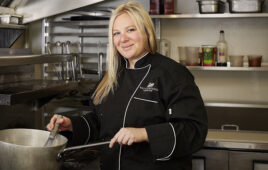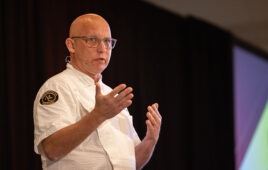Edward Leonard, Director of Culinary Operations and Executive Chef at The Polo Club of Boca Raton, believes certification furthers learning—and that’s what matters most.
I recently read Joanna DeChellis’ Editor’s Memo on certification and it caused me to pause and ponder the age-old debate about certification.
In her piece, she asks if being certified will make the member experience better, if having a CMC on staff will matter to the members and if the chef’s certification will make the food any better. Here’s the thing: Being certified matters if you make it matter and if it forces you to continue to learn, to push to be the best you can be and to give back to the culinary community.
This debate is funny to me as I strongly believe in the process of getting certified and what it means for a cook. I know my DNA and how I’m built. With or without my CMC, I would be the way I am. That said, taking the exam, preparing for the exam, being part of the circle has and will continue to open doors for me.
I’ll give you this: Where certifications might be lacking is the inclusion of the word “chef.” Being a “chef” means many more things than simply being able to cook. Certification is only a test of one’s craft skills—not of being a chef.
When I was ACF President, I made it part of our five-year plan to make certification more meaningful. We revamped the program so that all levels of certification would have to go through practical testing with other chefs in a kitchen in order to earn a certification. To receive paper certification without work or effort only serves to boost someone’s ego and, in truth, puts a stain on those who work hard for their certifications. Receiving a chef certification, whether global or other, but not having to take an exam and prove your skill is a farce.
But those who attempt to earn certification must study, prepare, and practice. The adage “practice makes perfect” is no lie. The process makes the individual a better cook as he or she learns or relearns lost skills. When it comes to the CMC exam, there are no shortcuts. And in the end, pass or fail, you will be a better cook afterward than you were before you started.
Too many club chefs do not push themselves. They do not take the time to learn and evolve. They do not understand trends and certification wouldn’t matter to their members because it doesn’t matter to the chef. Many of these chefs, even with long tenure, are let go because they do not advance the program. They do not raise the bar year after year or try to evolve. They get complacent. And the club sector is competitive. GMs and members want their programs to better than other clubs or restaurants in town.
And so, Joanna, yes, the food will be better if it’s prepared by a chef who is certified or is working to become certified. And, yes, the member experience will be better as well. The culinary world values a CMC certification for a reason and many industries, including ours, pay CMCs a higher salary than those not certified.
When I became a CMC, I accepted my responsibility to train, mentor, inspire and give back. This has furthered my learning. I have since mentored five culinarians who are now CMCs. And they have mentored countless others. I have found that the majority of chefs who have earned the CMC designation have a powerful drive. They push to learn. They thrive under the pressure of three initials that demand they be of a certain standard. Does this mean that chefs who do not have the initials don’t push, learn, or try to be better? Of course not. The culinary world is vast, it has many talented chefs from all levels, certified or not.
But the question of whether or not certification matters is simple. It matters. No, it’s not for everyone. It comes down to a personal choice and those without certification can be successful. But learning matters more. And certification furthers learning. I have said many times that I may be a teacher and a mentor, but I will always remain a student of the craft and profession.
Education—whether it is studying for an exam, entering a competition, visiting another club chef to see what he or she is doing, going to a conference, reading, web searching and even listening and watching your team—is paramount. As is respect and camaraderie.




